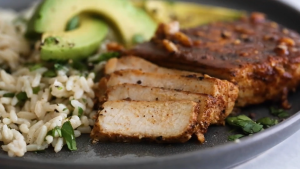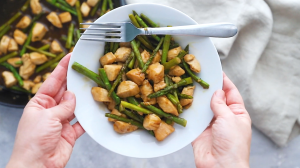This prosciutto, arugula and gorgonzola pizza recipe brings together a tantalizing blend of flavors. The saltiness of prosciutto, the pungency of gorgonzola and the peppery taste of arugula combine to create a pizza that's a feast for the senses. With a hint of sweetness from pears and a red onion crunch, it's a gourmet treat that's surprisingly easy to make at home.
While most of the ingredients for this pizza are commonplace in most homes, you may need to head to the supermarket for a few items. Prosciutto, an Italian dry-cured ham, can typically be found in the deli section. Gorgonzola, a veined Italian blue cheese, can be located in the cheese aisle. If baby arugula is not available, regular arugula can be used as a substitute.
Ingredients for Prosciutto, Arugula and Gorgonzola Pizza
Pizza crust: This is the base of the pizza. You can use a pre-made crust or make your own.
Olive oil: This is used to brush the pizza crust before adding the toppings.
Mozzarella cheese: This cheese will serve as the primary cheese for the pizza, adding a smooth, creamy flavor.
Pear: The sweetness of the pear adds a nice contrast to the saltiness of the prosciutto and gorgonzola.
Prosciutto: Prosciutto is an Italian dry-cured ham that adds a salty, savory flavor.
Red onion: Thinly sliced red onion adds a slight crunch and a mild flavor.
Gorgonzola: Gorgonzola is a type of blue cheese. It's strong and pungent, adding a depth of flavor to the pizza.
Arugula: Added after the pizza is cooked, arugula gives a fresh, peppery taste.
One reader, Jamal Valles says:





This prosciutto, arugula, and gorgonzola pizza recipe is a game-changer! The combination of flavors is divine, and the gorgonzola adds a delightful tang. The arugula provides a fresh, peppery kick. It's a must-try for pizza lovers!
Essential Techniques for Making Pizza Dough
How to assemble the pizza: Layer the pizza crust with olive oil, mozzarella cheese, pear slices, prosciutto, red onion, and gorgonzola.
How to bake the pizza: Place the assembled pizza in a preheated oven at 400 degrees F and bake for 10 to 12 minutes, or as per the package instructions, until the crust is slightly golden, the mozzarella is melted, and the gorgonzola is slightly golden.
How to finish the pizza: After removing the pizza from the oven, toss the baby arugula on top, slice the pizza, and serve immediately.
How To Make Prosciutto, Arugula & Gorgonzola Pizza
Serves:
Ingredients
- 1mediumprepared pizza crust,homemade or storebought
- 2tbspolive oil
- 1cupMozzarella cheese
- 1pear,ripe, any variety, cored and sliced very thin
- 6sliceprosciutto,slices, torn into smaller pieces
- ½red onion,sliced thin
- ½cupGorgonzola,crumbled
- 2cupsbaby arugula
Instructions
-
Preheat the oven to 400°F (200°C). Brush the pizza crust with the olive oil. Sprinkle the Mozzarella cheese evenly over the top of the crust. Then layer with pear slices, prosciutto, red onion and gorgonzola.
-
Bake pizza for 10-12 minutes (or according to package instructions), until crust is slightly golden and the Mozzarella is melted and the gorgonzola is slightly golden. Remove from oven, then toss the arugula on top. Slice pizza and serve immediately.
Nutrition
- Calories: 826.89kcal
- Fat: 43.18g
- Saturated Fat: 20.70g
- Monounsaturated Fat: 16.47g
- Polyunsaturated Fat: 3.65g
- Carbohydrates: 67.66g
- Fiber: 5.23g
- Sugar: 8.91g
- Protein: 41.82g
- Cholesterol: 114.97mg
- Sodium: 2338.09mg
- Calcium: 720.68mg
- Potassium: 511.90mg
- Iron: 3.98mg
- Vitamin A: 221.11µg
- Vitamin C: 4.88mg
Expert Tip for Achieving the Perfect Pizza Crust
To ensure your prosciutto stays tender and doesn't dry out during the baking process, consider adding it halfway through the cooking time. This will also preserve its rich, salty flavor, enhancing the overall taste of your pizza. Additionally, thinly slicing the pear and red onion will allow them to cook evenly and blend seamlessly with the other ingredients.
Time-Saving Tips for Making Homemade Pizza
Prep ahead: Prepare the pizza crust and chop the toppings in advance to save time when assembling the pizza.
Use pre-made dough: Save time by using store-bought pizza dough instead of making it from scratch.
Multi-task: While the pizza is baking, use that time to prepare a simple side salad or appetizer to complete the meal.
Organize ingredients: Before starting, gather and organize all the ingredients and kitchen tools needed for the recipe to streamline the cooking process.
Pre-sliced toppings: Purchase pre-sliced prosciutto and pre-crumbled gorgonzola to eliminate the need for additional prep time.
Substitute Ingredients For Prosciutto, Arugula & Gorgonzola Pizza Recipe
prosciutto - Substitute with smoked turkey: Smoked turkey has a similar smoky and savory flavor to prosciutto, and it provides a leaner alternative.
arugula - Substitute with baby spinach: Baby spinach has a mild, slightly peppery flavor similar to arugula and provides a nutritious and versatile alternative.
gorgonzola - Substitute with blue cheese: Blue cheese has a similar tangy and pungent flavor to gorgonzola, making it a suitable replacement in the pizza recipe.
Presentation Tips for Prosciutto, Arugula and Gorgonzola Pizza
Elevate the pizza crust: Use a high-quality, artisanal pizza crust that is hand-stretched and slightly charred for an authentic and rustic presentation.
Artfully arrange the toppings: Layer the pear slices, prosciutto, and red onion in an aesthetically pleasing manner, ensuring that each ingredient is evenly distributed for a balanced flavor profile in every bite.
Garnish with vibrant arugula: Toss the baby arugula in a light vinaigrette and delicately place it on top of the pizza just before serving, adding a pop of color and a fresh, peppery flavor to the dish.
Highlight the gorgonzola: Crumble the gorgonzola over the pizza, ensuring that it is evenly distributed to provide bursts of creamy, tangy flavor throughout the entire dish.
Emphasize the prosciutto: Arrange the prosciutto slices in a visually appealing pattern, allowing the rich, savory flavor of the cured meat to be showcased as a focal point of the dish.
Create a visually stunning presentation: Consider using a wooden pizza peel or a sleek serving platter to present the pizza, enhancing the overall visual appeal and sophistication of the dish.
Essential Kitchen Tools for Making Gourmet Pizza at Home
- Oven: You will need an oven to bake the pizza at 400 degrees Fahrenheit.
- Brush: Use a brush to evenly spread the olive oil on the pizza crust.
- Baking sheet: Place the prepared pizza on a baking sheet before putting it in the oven.
- Knife: Use a knife to slice the pear and red onion.
- Cutting board: A cutting board will provide a stable surface for slicing the pear and red onion.
- Measuring cup: Use a measuring cup to measure the mozzarella cheese and gorgonzola.
- Pizza cutter: After baking, use a pizza cutter to slice the pizza into portions for serving.
- Oven mitts: Protect your hands when handling the hot baking sheet and pizza with oven mitts.
- Tongs: Toss the arugula on top of the pizza using tongs for even distribution.
Storing and Freezing Homemade Pizza for Later
Let the pizza cool completely to room temperature before storing or freezing. This will prevent the crust from becoming soggy and the toppings from sliding off.
To store leftover pizza in the refrigerator, place the slices in an airtight container or wrap them tightly with plastic wrap or aluminum foil. Properly stored, the pizza will last for 3-4 days in the fridge.
For longer storage, you can freeze the pizza:
- Wrap individual slices tightly in plastic wrap, then place them in a freezer-safe container or freezer bag. This will help prevent freezer burn and make it easier to grab a slice when you're ready to eat.
- Alternatively, freeze the entire pizza by wrapping it tightly in plastic wrap, then aluminum foil. Place the wrapped pizza in a freezer-safe container or freezer bag.
- Label the container or bag with the date and contents for easy reference.
Frozen pizza will maintain its best quality for 1-2 months. After that, it will still be safe to eat but may experience changes in texture and flavor.
To reheat refrigerated pizza, place the slices on a baking sheet and heat in a preheated 350°F (175°C) oven for 5-10 minutes, or until warmed through and the cheese is melted.
For frozen pizza, you can either thaw it overnight in the refrigerator and then reheat as directed above, or reheat it directly from frozen. To reheat from frozen, place the pizza on a baking sheet and cover loosely with aluminum foil. Bake in a preheated 350°F (175°C) oven for 15-20 minutes, or until heated through and the cheese is melted.
Note that the arugula may wilt and lose its texture when reheated. For best results, you can remove the arugula before storing or freezing the pizza, and add fresh arugula when serving the reheated slices.
How To Reheat Leftover Pizza
Preheat your oven to 350°F (175°C). Place the leftover pizza slices on a baking sheet lined with parchment paper or aluminum foil. Bake for about 10 minutes, or until the crust is crispy and the cheese is melted. This method helps to restore the crispiness of the crust while evenly heating the toppings.
If you prefer a softer crust, you can reheat the pizza in the microwave. Place the slices on a microwave-safe plate and heat them on high power for 30-45 seconds, or until the cheese is melted and the pizza is heated through. Be careful not to overheat the pizza, as it can cause the prosciutto to become tough and the arugula to wilt.
For a quick and easy method, you can reheat the pizza in a skillet on the stovetop. Heat a non-stick skillet over medium heat and place the pizza slices in the pan. Cover the pan with a lid and heat for 2-3 minutes, or until the bottom of the crust is crispy and the cheese is melted. This method helps to crisp up the bottom of the crust while gently warming the toppings.
If you want to add a little extra flavor to your leftover pizza, try drizzling a small amount of olive oil over the slices before reheating. This will help to enhance the flavors of the prosciutto, arugula, and gorgonzola, while also keeping the crust moist and delicious.
For a gourmet touch, you can also add a few fresh toppings to your reheated pizza. Try topping the slices with some fresh baby arugula, thinly sliced red onion, or a sprinkle of gorgonzola before serving. This will give your leftover pizza a fresh and vibrant flavor that tastes just as good as when it was first made.
Interesting Trivia About Prosciutto, Arugula, and Gorgonzola
Prosciutto, arugula and gorgonzola pizza is a popular dish in Italy. It is believed that the first pizza was created in Naples, Italy in the 18th century. The original pizza was a simple flatbread topped with tomato sauce and mozzarella cheese. Over time, various toppings were added, including prosciutto, arugula, and gorgonzola. Today, pizza is enjoyed worldwide with countless variations. The combination of salty prosciutto, peppery arugula, and tangy gorgonzola creates a delicious and unique flavor profile that has become a favorite for many pizza lovers.
Is Making Gourmet Pizza at Home Cost-Effective?
This prosciutto, arugula and gorgonzola pizza recipe is moderately cost-effective for a household. The ingredients, such as prosciutto and gorgonzola, can be on the pricier side, but the overall cost is balanced by the use of arugula and basic pizza crust. The flavor combination and quality of ingredients justify the cost. Rating: 8/10. Approximate cost for a household of 4: $25-$30.
Is This Pizza Recipe Healthy or Unhealthy?
This prosciutto, arugula, and gorgonzola pizza recipe is a delightful blend of flavors, but it may not be the healthiest choice. Here's why:
- The pizza crust, depending on the type used, can be high in refined carbohydrates and low in fiber.
- Mozzarella and gorgonzola cheeses are high in saturated fat and sodium, which can contribute to heart disease and high blood pressure when consumed in excess.
- Prosciutto, while delicious, is also high in sodium and saturated fat.
- The recipe lacks a significant source of vegetables, which are essential for a balanced and nutritious meal.
However, the inclusion of arugula and pear adds a touch of freshness and provides some vitamins and minerals.
To make this pizza a healthier option, consider the following suggestions:
- Opt for a whole wheat or cauliflower pizza crust to increase fiber intake and reduce refined carbohydrates.
- Reduce the amount of mozzarella and gorgonzola cheese used, or choose lower-fat alternatives like part-skim mozzarella or feta.
- Use prosciutto sparingly as a garnish rather than a main topping, or replace it with a leaner protein source like grilled chicken or shrimp.
- Increase the amount of arugula and add other nutrient-dense vegetables like bell peppers, mushrooms, or cherry tomatoes to boost the pizza's nutritional value.
- Drizzle the pizza with a balsamic glaze instead of extra olive oil to add flavor without increasing the fat content significantly.
By making these adjustments, you can enjoy a tasty and more balanced meal that still satisfies your pizza cravings.
Editor's Opinion: Why This Pizza Recipe Is a Must-Try
This prosciutto, arugula, and gorgonzola pizza recipe is a delightful combination of flavors and textures. The saltiness of the prosciutto pairs perfectly with the peppery arugula and the creamy gorgonzola. The addition of sweet pear and tangy red onion adds a wonderful depth of flavor. The combination of these ingredients on a crispy pizza crust creates a harmonious and satisfying dish that is sure to impress your guests. Enjoy!
Enhance Your Prosciutto, Arugula & Gorgonzola Pizza Recipe with These Unique Side Dishes:
Similar Gourmet Pizza Recipes to Try
Appetizer and Dessert Ideas to Complement This Pizza
Why trust this Prosciutto, Arugula & Gorgonzola Pizza Recipe:
This recipe is a perfect balance of flavors and textures, featuring the classic combination of prosciutto, peppery arugula, and creamy gorgonzola. The sweetness of the pear complements the saltiness of the prosciutto, while the sharpness of the gorgonzola adds depth. The use of mozzarella cheese as a base ensures a gooey, melty finish. The addition of red onion provides a subtle bite, and the finishing touch of fresh arugula adds a vibrant, peppery note. This recipe promises a delightful experience for your taste buds.
Was this page helpful?
Have your own special recipe to share? Submit Your Recipe Today!











-recipe-300x168.png)
